On September 30, Hanoi Oncology Hospital announced that doctors had just received treatment for a 64-year-old female patient in Thai Nguyen with a tumor measuring up to 20cm, occupying almost the entire chest.
The patient discovered the tumor a year ago but refused surgery. It was not until he had increasing difficulty breathing, his health deteriorated, and he lost 5kg that he went to the hospital.
At Hanoi Oncology Hospital, the X-ray results showed that the patient's right chest had a solid mass measuring 20x15cm, collapsing the lung, infiltrating the mediastinum and chest wall. The patient underwent a biopsy of the tumor, and the pathological result was a solitary fibrous tumor.
Before the surgery, the team had to consult very carefully because the operations had to be performed in an extremely narrow operating room. The tumor had a rich blood supply so it had to be dissected meticulously to ensure the safety of the surgery and limit blood loss for the patient.
The surgery was successful, the removed tumor weighed more than 2kg. After surgery, the patient recovered well and was discharged after 5 days.
Another case, a 63-year-old female patient in Dong Anh (Hanoi) is also a dangerous case. The patient was diagnosed with an ovarian tumor more than a year ago, along with a large polyp in the uterine cavity causing heavy bleeding. However, when the doctor advised early surgery, the patient refused and went home to take medicine based on word of mouth advice. Only when the bleeding became severe, her weight rapidly decreased within a month, and she occasionally fainted suddenly did the patient return to the hospital.
At Hanoi Oncology Hospital, test results showed that the patient had a 20x25cm tumor in the lower abdomen. The patient's health was very poor, with severe anemia.
To save the patient's life, doctors from the Department of Breast Surgery and Gynecology performed surgery.

This is a case of a patient with a large ovarian tumor and a particularly dangerous cardiovascular disease, so the surgery must be performed quickly and the bleeding must be stopped carefully to avoid post-operative bleeding as well as the risk of continued pulmonary embolism, cerebral infarction, myocardial infarction, etc., which can all affect the patient's life.
The patient underwent total hysterectomy and bilateral adnexectomy. After 10 days of surgery, the patient recovered well. Postoperative pathology results showed that the patient had ovarian cancer.
Oncologists recommend that when patients discover a tumor but delay treatment, not only will surgery become more difficult, but there is also a risk of the disease becoming malignant, affecting their lives. Therefore, when treatment is indicated, patients should not hesitate and miss the "golden time" for treatment.
Patients need to go to a specialized medical facility for examination. In particular, women should have regular health check-ups to screen, detect and treat gynecological cancer early.










